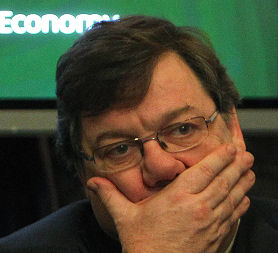Brian Cowen: shades of Downing Street 1990?
As the Irish PM Brian Cowen announces his intention to stay on as party leader, Irish expert Dr Peter Stafford sees echoes of both Gordon Brown and Margaret Thatcher in his decisions.

Since their appointment as finance ministers and then prime minister and Taoiseach respectively, many Irish commentators have made parallels between the careers of Gordon Brown and Brian Cowen, and with good reason. However, this coming week in Irish politics will more closely resemble Britain during November 1990 as Cowen puts his future in the hands of his parliamentary colleagues.
Cowen’s period as minister for finance and head of government have many similarities with Gordon Brown – the man who was his British opposite number for many years. Both Cowen and Brown were life-long politicians, born into their parties, and both men were appointed to finance portfolios by prime ministers whom they eventually succeeded; Brown in mid-2007, Cowen a year later. The nature of their appointments as head of government – by party appointment rather than election – and the collapse of the economies which they built up undermined the authority of both men who quickly turned from electoral asset to liability.
There has been greater opportunity to assess the legacy of Gordon Brown as finance minister and prime minister than Cowen, but history is likely to find ever more points of similarity in personality and policy, especially in the way both promoted economic growth underpinned by a property bubble and enormous international borrowings. Both men left the consequences of their economic policies to incoming opposition governments.
In personality too, both Brown and Cowen were portrayed as the dour, socially-awkward shrewd politician, happily hiding in the shadows of the charismatic and personable Bertie Ahern and Tony Blair. On taking office from Ahern, Cowen was thrust into the middle of the first Lisbon Treaty referendum campaign which the government lost, and which heralded a series of motions of no-confidence in his and his party’s performance which have dogged his premiership.
On the campaign trail, Cowen has delighted the media with his lack of polish and flair for public speaking. Both his political handlers and his parliamentary colleagues have been forced time and again to explain away poor and sometimes tetchy performances, including a now-notorious early morning radio interview following a party conference during which – according to opposition politicians – he was either hungover or drunk. Cowen denied both accusations but admitted the interview was “not his best performance”.
As Minister for Finance, Cowen received delegations of international financiers, bankers and officials from around the world, desperate to learn how the Irish had transformed their failing economy, and to be shown how to repeat the magic at home. Cowen, as Finance Minister, was one of Fianna Fail’s main electoral assets and (like perhaps backbench Labour MPs in June 2007) hoped he could continue the magic as party leader.
Cowen has delighted the media with his lack of polish and flair for public speaking.
However, it is the legacy of the economic model which Cowen presided over and allegations of cronyism and collusion with the heads of the failed Irish banks which gave backbench politicians the freedom to talk of removing Cowen from office in advance of the forthcoming general election. Revelations of rounds of golf and private dinners between Cowen and the now disgraced bankers in the weeks leading up to the bailout of Anglo-Irish Bank have further undermined Cowen’s reputation as the architect of the Celtic Tiger economy.
Today, Cowen has set out the timetable which will dictate whether continues to follow Gordon Brown’s career and lead his party into electoral defeat, or whether he is forced to follow Margaret Thatcher and be quietly removed by a delegation of backbenchers, nervous about their own seats.
Just like Thatcher in 1990, Cowen’s announcement today has followed weeks of speculation, gossip and media-fuelled speculation. Like Thatcher, Cowen has spent this weekend talking individually to his cabinet and assessing their take on whether he should lead his party into an election he is sure to lose. The result of this conversation is that he will table a motion of confidence in himself as leader of his party.
Cowen’s announcement of a secret ballot amongst his backbenchers on his leadership echoes Thatcher’s comments on the steps of Downing Street in November 1990 when going to meet her own backbenchers: “I fight on, I fight to win.”
Within a fortnight she was gone.
Dr Peter Stafford, is an economic and business researcher based in Dublin, Ireland
Twitter: @peterstafford
-
Latest news
-
‘It’s absolutely clear that these advances were unwanted,’ says producer of new Channel 4 Spacey documentary4m

-
India opposition accuses government of ‘crackdown’ as election gets under way2m

-
Sadiq Khan wins historic third term as London mayor2m

-
Labour’s Andy Burnham re-elected as mayor of Greater Manchester4m

-
Andy Street ‘winning or nearly winning’ is an extraordinary result for Tories, deputy foreign minister says4m

-




